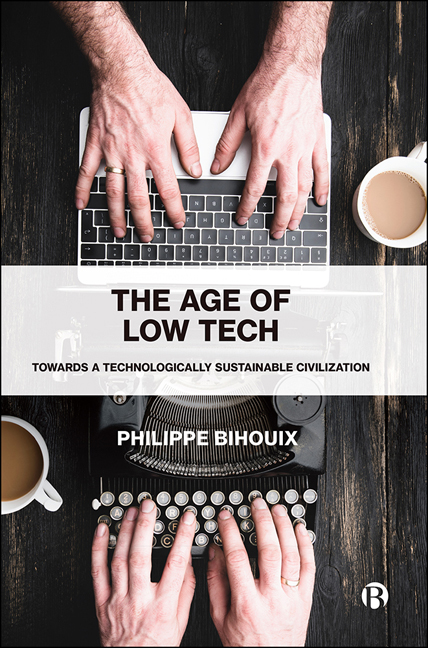Book contents
- Frontmatter
- Contents
- List of Figures and Tables
- Acknowledgements
- Preface to the English Edition
- Prologue: The Mad Dance of the Shrimps
- Part I The Rise and Fall of ‘Engineering Miracle-Workers’
- Part II The Principles of Simple Technologies
- Part III Daily Life in the Era of Simple Technologies
- Part IV Is ‘Transition’ Possible?
- Epilogue: A Dream If Ever There Was One
- Notes
- Index
Part IV - Is ‘Transition’ Possible?
Published online by Cambridge University Press: 19 March 2021
- Frontmatter
- Contents
- List of Figures and Tables
- Acknowledgements
- Preface to the English Edition
- Prologue: The Mad Dance of the Shrimps
- Part I The Rise and Fall of ‘Engineering Miracle-Workers’
- Part II The Principles of Simple Technologies
- Part III Daily Life in the Era of Simple Technologies
- Part IV Is ‘Transition’ Possible?
- Epilogue: A Dream If Ever There Was One
- Notes
- Index
Summary
It is time to reflect on the real possibilities of turning our crazy ship around, and of effecting a transition from our society in peril to a world of low technology that is parsimonious in its use of resources. While the proposals put forward might indeed be possible technically, we need to be very sceptical about the real possibility of making such a turn, or, to mix our metaphors, of applying the brakes to our fastaccelerating world.
This is clearly due to the severity of the necessary changes, to the systematic reversal of trends that have been in place for decades, even centuries, that seems so shockingly reactionary to the more progressive among us. But it is also because we have not addressed any of the cultural, societal, moral or political aspects that would necessarily accompany the technical and organizational developments: a fresh relationship with work, and new, more moderate consumer practices.
Is it possible to generate enthusiasm for such a ‘programme’, or could it at least become ‘socially acceptable’? Could it be compatible with the various pressing democratic imperatives that require rapid results under penalty of immediate sanction in the polls, or with international relationships or the pressure of a media system fed by advertising revenues, and therefore inherently opposed to any form of sobriety? All of this in a world facing financial, geopolitical and climatic upheaval? The least we can say is that it will not be a done deal.
The impossible status quo
Let us assume that a transition of such complexity is indeed completely unimaginable, even if proposed and then supported by a sufficient majority. But, on the other hand, can we afford to keep going as we are?
Some possible analyses of the situation
Let us imagine the views of a random participant in a discussion on the current and future difficulties of the world: there is a good chance that a sensible person will recognize soon enough that things cannot go on like this. We all know this more or less implicitly, perhaps not admitting it so willingly because the cognitive dissonance with the need to continue to live on a daily basis, to make ends meet or to enrol the little one in the nursery, would be too great.
- Type
- Chapter
- Information
- The Age of Low TechTowards a Technologically Sustainable Civilization, pp. 135 - 160Publisher: Bristol University PressPrint publication year: 2020



